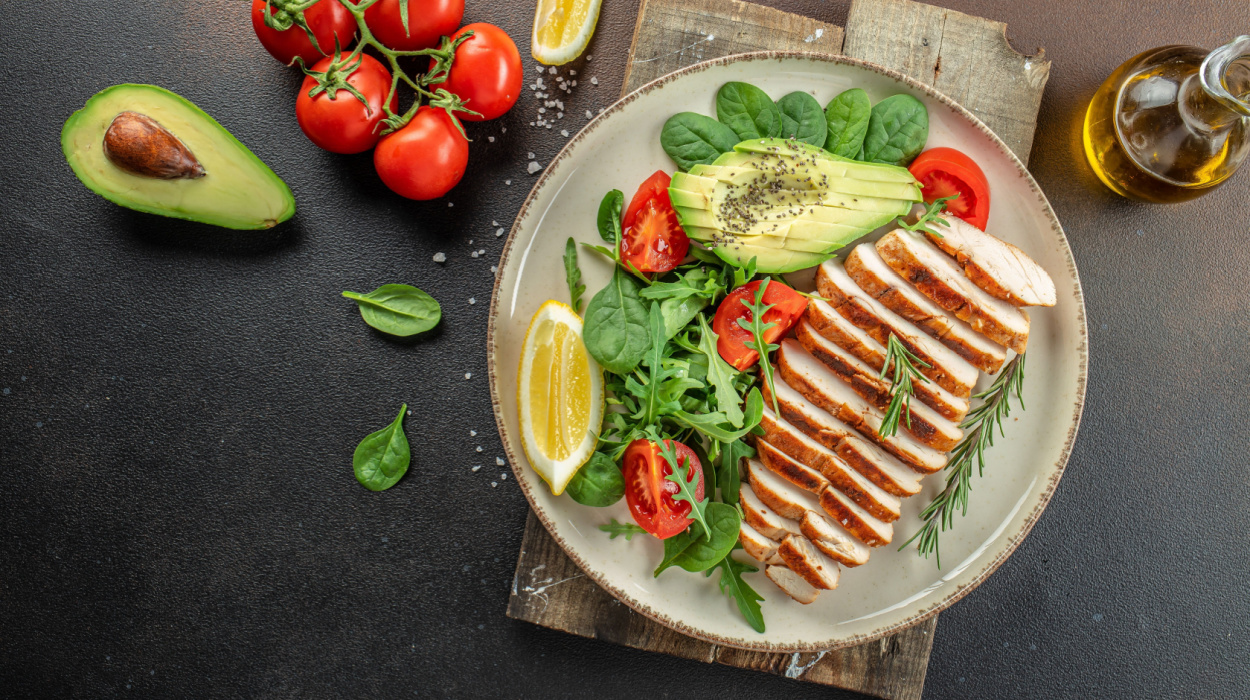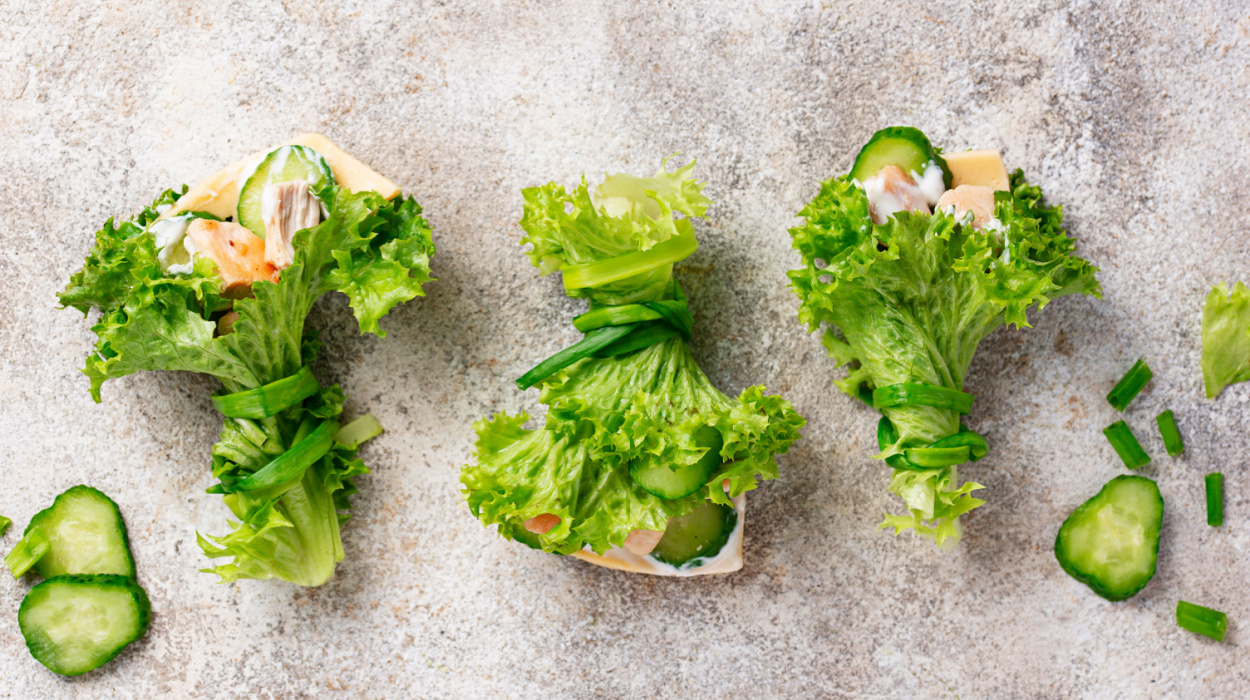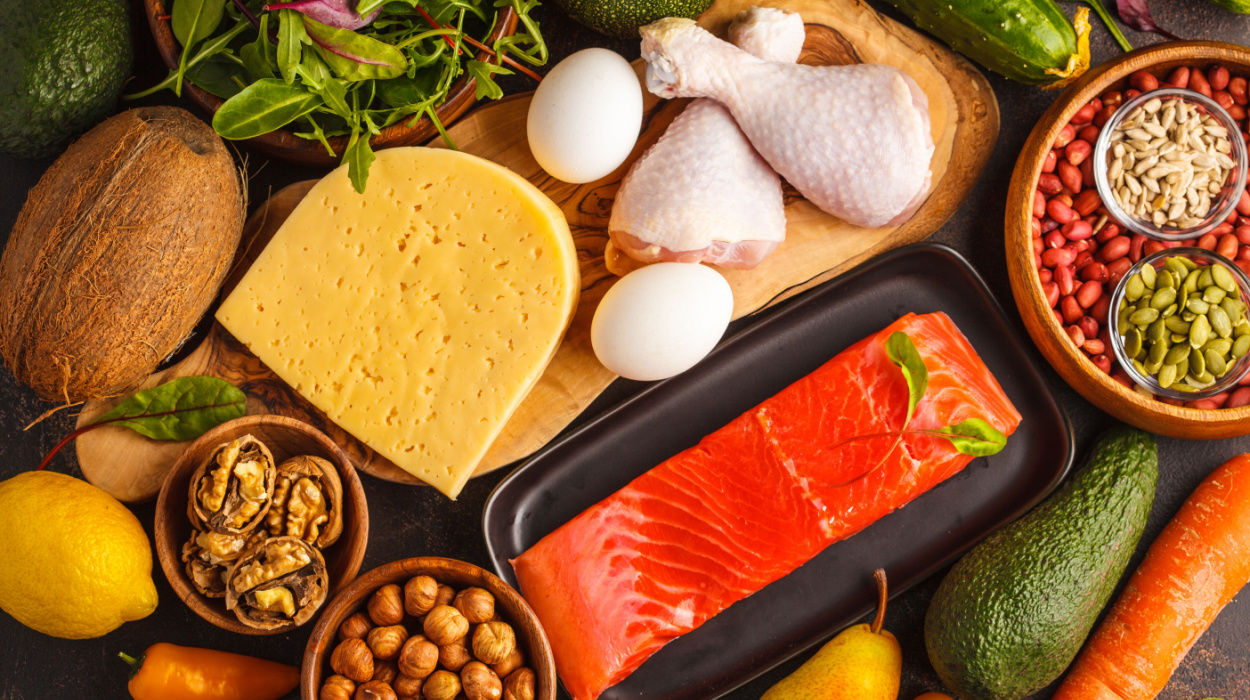 Expert's opinion
Expert's opinion
Expert's opinion
The article is a subjective view on this topic written by writers specializing in medical writing.
It may reflect on a personal journey surrounding struggles with an illness or medical condition, involve product comparisons, diet considerations, or other health-related opinions.
Although the view is entirely that of the writer, it is based on academic experiences and scientific research they have conducted; it is fact-checked by a team of degreed medical experts, and validated by sources attached to the article.
The numbers in parenthesis (1,2,3) will take you to clickable links to related scientific papers.
High-Protein, Low-Carb Meals: Meal Ideas For 2024

Are you looking for nutritious meal options to complement a healthy lifestyle? A low-carb diet offers various benefits for those on a health journey, whether striving for weight loss, muscle gain, or a more balanced and nutritious diet. High protein, low carb meals offer a healthy nutritional profile that leaves you feeling full and energized.
With a flavorful array of dishes that taste great, healthy high protein, low carb foods help curb food cravings and promote optimal health. Read on to explore the benefits of incorporating high protein, low carb recipes into your daily routine and find some excellent healthy recipe ideas that inspire your inner chef.
Healthy High-Protein, Low-Carb Meals Ideas
Experimenting with high-protein, low-carb meal options is easy once you find protein-rich foods. Some excellent high-protein recipes also fit a low-carb diet when looking for a delicious and easy recipe. Try these low-carbohydrate, high-protein meals:
- Grilled chicken with roasted vegetables.
- Baked salmon with asparagus.
- Cauliflower fried rice with shrimp.
- Turkey lettuce wraps.
- Greek salad with chicken.
Satisfying High Protein Low Carb Diet Meals
It can be fun finding your favorite high-protein, low-carb meal! Today, you can even find high-protein, low-carb meal delivery services to meet your dietary goals on the go.
If you like to meal prep yourself, here are some great meal options:
Grilled Chicken With Roasted Vegetables
Chicken breast is a primary source of lean protein in many high-protein, low-carb dinner options. A great way to incorporate chicken into your diet is to marinate it with various herbs and spices and grill it. You can serve roasted chicken with roasted vegetables like broccoli, zucchini, or bell peppers combined with cucumber salad to create a nutritious and satisfying meal that excites the taste buds for your healthy dinner.
Baked Salmon With Asparagus
Salmon is another excellent source of lean protein that can be paired with various seasonings and low-carb sauces. Season salmon fillets with lemon juice, garlic, and dill and bake until tender. Lightly steamed asparagus pairs well with salmon to provide a protein-packed, fiber-rich meal with enough crunch to satisfy you until bedtime.
Cauliflower Fried Rice With Shrimp
Riced cauliflower paired with shrimp for a fried rice alternative.
While you can buy cauliflower rice in the prepared and frozen foods aisle, check the ingredients to ensure there aren’t any added sugars. Making your own cauliflower rice is also easy. Simply pulse florets in the food processor until they have a rice-like texture. Sauté it with shrimp, mixed vegetables, and an egg. Then, season with coconut aminos or low-sodium soy sauce for a delicious, low-carb carb alternative to traditional fried rice.
Turkey Lettuce Wraps

You can use sliced turkey breast or ground turkey sauteed with onions, garlic, and spices. Wrap it in crispy lettuce leaves and top with diced tomatoes, avocado slices, or your favorite sandwich topper. You can also add a dollop of plain Greek yogurt for more protein.
Greek Salad With Chicken
If you want a healthy, nutrient-packed salad for low-carb dinners, this suggestion is for you. Choose your favorite combination of fresh mixed greens. Add cherry tomatoes, cucumbers, olives, and low-fat cheese. Then, top it with grilled chicken seasoned with lemon juice, oregano, and black pepper for a tasty meal at lunch or dinner. Drizzle with olive oil, vinegar, and herbs, or top with your favorite low-sugar, low-carb salad dressing.
What Is A High Protein, Low Carb Diet?
Fad diets promise quick results that don’t last. They typically leave you unsatisfied and deprived, looking for snack ideas to hold you over until your next meal. On the contrary, following a high protein, low carb meal plan has proven effective and sustainable for countless individuals hoping to improve their health and achieve their weight loss goals.
Essentially, a high protein, low carb diet focuses on consuming protein-rich foods while reducing your intake of carbohydrates. Those following a high protein, low carb diet would primarily eat lean meats, poultry, fish, eggs, and dairy products while reducing consumption of refined sugars and grains. The overall goal of this dietary strategy is to shift your body’s primary fuel source from carbohydrates to fats, leading to a state of ketosis that burns stored fat for energy.
Weight Loss Advantages
One of the key advantages of a high protein, low carb diet is its ability to promote weight loss. Clinical trials found that exceeding the recommended dietary allowance of protein reduces body weight and enhances body composition[1] as fat mass is decreased fat mass and fat-free mass is preserved. Additionally, sticking to a low-carbohydrate diet has proven to produce more significant weight loss than conventional diets, improving risk factors for coronary heart disease.[2]
By reducing your intake of carbohydrates, your body turns to its fat stores for energy, allowing you to burn fat more efficiently. Since protein has a higher thermic effect[3] than carbohydrates, your body expends more energy to digest and process protein-rich foods. The increased metabolic rate that results can contribute to greater calorie burn, which ultimately aids in weight loss.
Beyond weight loss, healthy high protein, low carb meals offer many additional health benefits. Protein is vital in building and repairing tissues,[4] supporting muscle growth, and boosting immune function. Prioritizing protein induces a significant rise in muscle protein synthesis.[5] Ultimately, consuming protein before or after a workout enhances your ability to recover from exercise, maintain lean muscle mass, and support your overall physical well-being.
Lower carb intake helps stabilize blood sugar levels,[6] making this diet an ideal choice for individuals with diabetes. Reducing carb consumption also minimizes insulin secretion and improves insulin sensitivity, improving blood sugar control and reducing the risk of chronic diseases such as type 2 diabetes.
Who Would Benefit From High Protein, Low Carb Meals?
A high protein, low carb meal plan can benefit a range of individuals seeking to improve their health and well-being.
Individuals With Weight Loss Goals
Those looking to shed excess pounds can benefit significantly from high-protein, low-carb foods. Reducing carbohydrate intake and increasing protein consumption leads to greater satiety, improved metabolic rate, and enhanced fat-burning capabilities, all contributing to effective and sustainable weight loss.
Athletes And Fitness Enthusiasts
High-protein, low-carb diets are popular among athletes and fitness enthusiasts. Since they support muscle growth, repair, and recovery, they are integral to many training regimens. Athletes following these diets optimize performance,[7] increase lean muscle mass, and experience better post-exercise recovery.
Individuals With Diabetes
High protein, low carb diets also benefit those with diabetes or those seeking better glucose control. Limiting carbohydrate intake prevents blood sugar spikes, reduces insulin secretion, and improves insulin sensitivity. Therefore, a low-carb, high-protein diet can improve blood sugar control[8] and minimize the risk of diabetes-associated complications.
Individuals With Cardiovascular Health Issues
Individuals looking to improve blood pressure,[2] cholesterol levels, and triglycerides can also benefit from a low-carb, high-protein diet. Reducing carbohydrate intake and focusing on lean protein and healthy fats allows those with cardiovascular concerns to improve their overall health profile, thus reducing their disease risk.
High Protein Low Carb Foods List

Incorporating a high protein, low carb diet into your lifestyle doesn’t mean you’ll need to sacrifice flavor or meal options. You can still enjoy diverse and satisfying meals with various protein sources available. Combining proteins with abundant colorful vegetables, healthy fats, and smaller portions of complex carbohydrates allows you to create balanced and nourishing meals that support your goals.
Here’s an example of a high-protein, low-carb foods list:
- Lean meats, including chicken breast, turkey breast, pork tenderloin, and lean sirloin.
- Fish and seafood, including salmon, trout, tuna, shrimp, and crab.
- Eggs.
- Plain or unsweetened yogurt.
- Low-fat cottage cheese.
- Plant-based protein sources are low in carbs, such as tofu and tempeh.
- Legumes, including edamame, tofu, snow peas, green beans, and lentils.
- Nuts and seeds include flaxseeds, almonds, walnuts, and chia seeds.
- Low-fat or reduced-fat cheeses.
- High-quality, low-carb protein powder.
Tips To Build Healthy High Protein & Low Carb Meals
Building easy, high-protein, low-carb meals is about balance. The best way to start is to incorporate lean protein sources as the foundation of your meal. Pair protein-rich foods with non-starchy vegetables such as broccoli and spinach for added nutrients.[9]
You can also include healthy fats from avocados, nuts, and olive oil to enhance satiety and flavor. Make cooking an adventure by experimenting with herbs, spices, and healthy creamy sauce to add flavor without adding sugar or calories. Avoid processed carbs and choose whole-grain alternatives or low-carb foods like cauliflower rice and zucchini noodles. Finally, consult a registered dietitian to portion meals accordingly.
Conclusion
Incorporating high protein, low carb foods into your diet offers numerous benefits, from supporting weight loss and muscle growth to stabilizing blood sugar levels and promoting overall health. You can nourish your body by focusing on lean proteins, non-starchy vegetables, and healthy fats while maintaining a balanced and satisfying eating plan.
Frequently Asked Questions
Yes. High-protein, low-carb meals can benefit weight loss. Reducing carb intake and increasing protein consumption promotes satiety, enhances metabolism, and supports fat loss.
Certainly! Protein is essential for muscle growth, repair, and recovery. Incorporating high-protein foods into your diet and regular exercise supports muscle development and recovery.
Yes. Plenty of plant-based protein sources, including tofu, legumes, and certain grains like quinoa, are available.
While high protein, low carb meals can benefit many individuals, it’s essential to consider your needs and health conditions. Consult with a healthcare professional before making significant dietary changes.
Yes, but the focus must be on consuming complex carbohydrates in moderation. Examples include whole grains, starchy vegetables, and nutrient-dense fruits.
+ 9 sources
Health Canal avoids using tertiary references. We have strict sourcing guidelines and rely on peer-reviewed studies, academic researches from medical associations and institutions. To ensure the accuracy of articles in Health Canal, you can read more about the editorial process here
- Moon, J. and Koh, G. (2020). Clinical Evidence and Mechanisms of High-Protein Diet-Induced Weight Loss. [online] 29(3), pp.166–173. doi:https://doi.org/10.7570/jomes20028.
- dong, tingting, Guo, M., Zhang, P., Sun, G. and Chen, B. (2020). The effects of low-carbohydrate diets on cardiovascular risk factors: A meta-analysis. [online] 15(1), pp.e0225348–e0225348. doi:https://doi.org/10.1371/journal.pone.0225348.
- Pesta, D. and Samuel, V.T. (2014). A high-protein diet for reducing body fat: mechanisms and possible caveats. [online] 11(1), pp.53–53. doi:https://doi.org/10.1186/1743-7075-11-53.
- Carbone, J.W. and Pasiakos, S.M. (2019). Dietary Protein and Muscle Mass: Translating Science to Application and Health Benefit. [online] 11(5), pp.1136–1136. doi:https://doi.org/10.3390/nu11051136.
- Cintineo, H.P., Arent, M.A., Antonio, J. and Arent, S.M. (2018). Effects of Protein Supplementation on Performance and Recovery in Resistance and Endurance Training. [online] 5. doi:https://doi.org/10.3389/fnut.2018.00083.
- Wang, L., Wang, Q., Yong Sang Hong, Ojo, O., Jiang, Q., Hou, Y., Huang, Y. and Wang, X. (2018). The Effect of Low-Carbohydrate Diet on Glycemic Control in Patients with Type 2 Diabetes Mellitus. [online] 10(6), pp.661–661. doi:https://doi.org/10.3390/nu10060661.
- Antonio, J., Candow, D.G., Forbes, S.C., Ormsbee, M.J., Saracino, P.G. and Roberts, J.D. (2020). Effects of Dietary Protein on Body Composition in Exercising Individuals. [online] 12(6), pp.1890–1890. doi:https://doi.org/10.3390/nu12061890.
- Wheatley, S.D., Deakin, T., Arjomandkhah, N.C., Hollinrake, P.G. and Reeves, T.E. (2021). Low Carbohydrate Dietary Approaches for People With Type 2 Diabetes—A Narrative Review. [online] 8. doi:https://doi.org/10.3389/fnut.2021.687658.
- Roberts, J.L. and Moreau, R. (2016). Functional properties of spinach (Spinacia oleracea L.) phytochemicals and bioactives. [online] 7(8), pp.3337–3353. doi:https://doi.org/10.1039/c6fo00051g.



